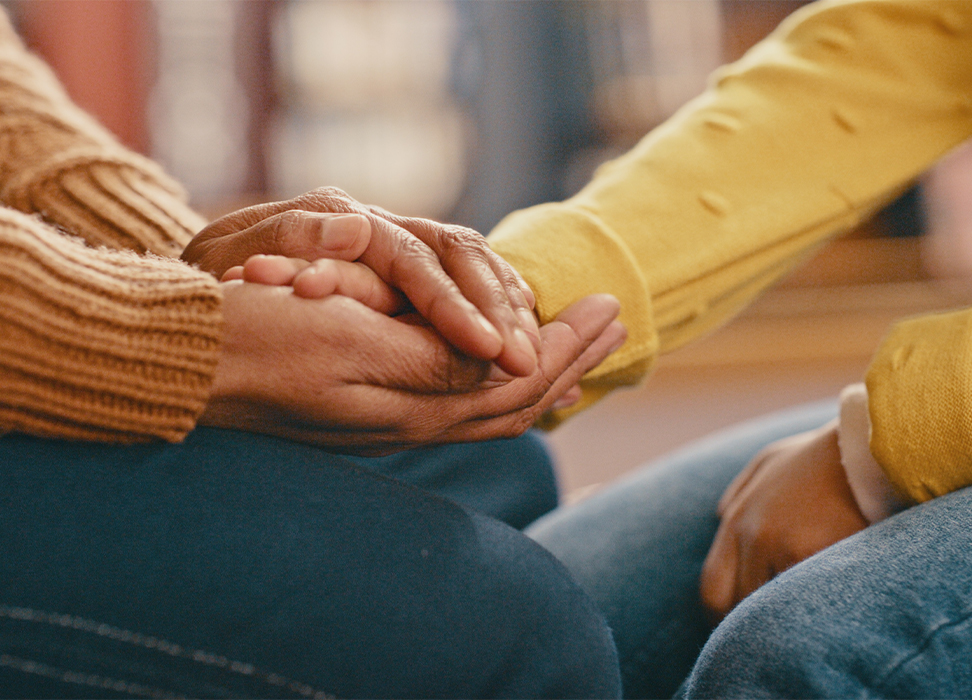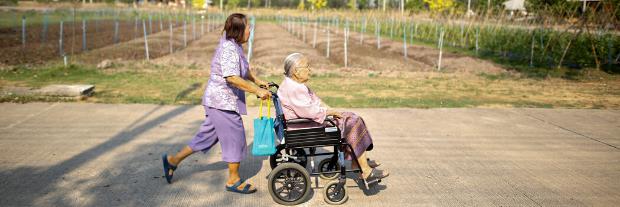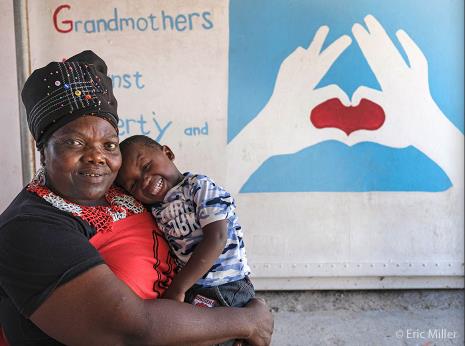
Emma Bishop likes to make cakes and go disco dancing. She also loves her job helping other people with learning disabilities and Down syndrome. Thanks to a support group, Emma lives independently and makes her own life choices.
Maxensia Nakibuuka tested positive for HIV 25 years ago. After the diagnosis, she faced stigma, unemployment and disability. Drawing on her strength and experience, Nakibuuka started a community organization that provides care and support to vulnerable women and girls living with HIV in Uganda.
Frances Zainoeddin spent a lifetime working for the UN, but after retirement she became an activist for the human rights of older persons. Today Zainoeddin is fighting for an international legal instrument for older persons to make sure their human rights are fully protected and their voices are being heard, both as receivers and providers of care and support.
On 29 October, the global community marks the first International Day of Care and Support, a day to uphold the rights of both givers and receivers of care and support, and to honour the work of millions of care and support givers and rights defenders around the world like Emma, Nakibuuka, and Zainoeddin.
“Care and support should not merely be seen as an act of charity. It’s a matter of human rights,” Volker Türk, UN Human Rights chief, said during a speech on the 75th anniversary of the Universal Declaration of Human Rights, calling on States to radically reshape their understanding of support and care systems.
People as centre of care and support
UN Human Rights plays a central role in promoting the human rights of everybody in care and support systems, bringing together the rights and voices of women, persons with disabilities, children, young people and older persons, both as people who provide and receive care and support.
Facundo Chavez Penillas, Human Rights Adviser on Disability Rights at UN Human Rights, said everyone needs care and support from others at some stage, if not throughout their life, to live with dignity and participate in society.
However, many are excluded due to a lack of access to quality care and support.
“Current care and support systems are failing to support sustainable and resilient societies and economies,” he said, adding that care and support systems are a key lever for sustainable development, social justice and an inclusive society that leaves no one behind.
Hannah Wu, Chief of Women’s Rights and Gender, UN Human Rights, said current systems overburden women, including women with disabilities, girls, and young and older women, with a disproportionate share of care and support work.
“A human rights-based care and support system is imperative for gender equality,” Wu said.
The International Day of Care and Support is an opportunity to take concrete steps to recognize the economic and social value of care and support, reduce and redistribute unpaid care work and reward paid care workers, while securing access to quality care and support, and ensure representation of persons giving and receiving care and support in decision-making.
“It is important to speak up and be heard”
“If you want to go out somewhere, support can help you plan things and make sure you get the right bus.” © Emma Bishop
“If you want to go out somewhere, support can help you plan things and make sure you get the right bus.” © Emma Bishop
“Support is really important for people with learning disabilities,” said Emma, 44, who works for Down Syndrome International, a global network of people with Down syndrome and their families.
“Governments should listen to people with disabilities and ask what support we need. With support I live independently with my boyfriend, Ben. I have a job and my own bank account. I have hobbies and friends, and I do the things I want to do, like going on holidays or getting my haircut.”
In July, Emma travelled to New York and gave two presentations to UN officials, NGOs and people with disabilities from across the globe on what policies should be changed to make the world a more inclusive place for people with disabilities.
“I was very nervous but when I finished, I felt great. It is important to speak up and be heard.”
“Women are on the frontline of care”
“At LUCOHECO, we focus on both behavioral change and preventive strategies to effectively combat HIV in the community.” © Maxensia Nakibuuka
“At LUCOHECO, we focus on both behavioral change and preventive strategies to effectively combat HIV in the community.” © Maxensia Nakibuuka
Across the world, the bulk of care and support work is left to women, including girls, young women, older women and women with disabilities, without recognition or adequate pay, hindering their equal participation in society.
Nakibuuka knows the meaning of care and support from her own life experience.
“I was at school when my brothers and sisters fell sick with HIV, so I became the caregiver at home. Before, it was my mother who took care of us.”
In 2005, after finding out she was HIV positive, Nakibuuka founded the Lungujja Community Health Caring Organization (LUCOHECO). When COVID-19 hit, it was female community health workers and groups like hers who first rose up to fight the pandemic. The same happened with diseases like malaria, TB and Ebola
“Women and grassroots organizations are always on the frontline of care. We are the last ones standing. Recognition is not just about getting paid for a job we are passionate about. It is also about participating in the decision-making process as experts. Our politicians need to understand that.”
Human rights of older persons
“Human rights don"t stop at a certain age, be that 60, 75 or 110.” © Frances Zainoeddin
“Human rights don"t stop at a certain age, be that 60, 75 or 110.” © Frances Zainoeddin
“Our human rights do not diminish with age,” said Zainoeddin.
Zainoeddin, 82, represents the International Federation on Ageing and Soroptimist International at the UN in New York. She also participates in the Open-ended Working Group on Ageing, established by the General Assembly to strengthen the protection of the rights of older persons and to consider the feasibility of further instruments and measures to protect those rights.
“The current international framework is inadequate. A convention on the rights of older persons would establish legal and minimum standards of practice, and would help fight attitudes such as discrimination, ageism or stigma. It would mean respect for the dignity of a person throughout the life course.”
Claudia Mahler, Independent Expert on the enjoyment of all human rights by older persons, said the COVID-19 pandemic exposed critical human rights protection gaps that have existed for years, such as discrimination based on older age, lack of social protection and access to affordable health services, lack of autonomy and participation in decision-making.
“The voices of older people need to be heard. Often, it is doctors and nurses who speak with the family members and make the decisions. The will and preferences of older people need to be taken into account,” said Mahler.
Zainoeddin said older persons are often invisible and are seen as mere recipients of services. But they also provide care and support to others.
“Older persons are contributors to their families, communities and the national economy. They should not be viewed as a burden on society.”
Awareness of the human rights of persons with disabilities
“I am the proud father of a son with Down syndrome.” © Sarder Razzak
“I am the proud father of a son with Down syndrome.” © Sarder Razzak
“We need more awareness in society towards people living with disabilities and their families,” said Sarder Razzak, chairman and founder of Down Syndrome Society of Bangladesh.
“Governments and sometimes even doctors and care providers do not understand the kind of care and support people living with disabilities need in order to live with dignity and independence.”
Razzak, whose 15-year old son, Rafan, was born with Down syndrome, started his organization as a small support group for parents of children with Down syndrome. Today, the Down Syndrome Society of Bangladesh raises awareness of persons with disabilities across the South Asian country, and provides health services, counselling and occupational training.
“People with Down syndrome have the same human rights as every person without a disability. This means things like access to inclusive health, inclusive education, inclusive employment to support their self-reliance and livelihoods.”
Tags










